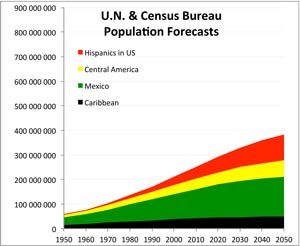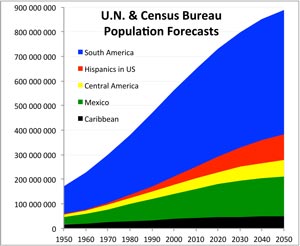Here is an article by Steve Sailer that I found quite informative. There is much here is to make you think of the changing future of of the world. During this century much is going to change in the world order and makeup. There is no stopping it but it can be slowed down. Remember immigration changes much. North America is a prime example.
Europe’s self-inflicted “migrant crisis” ought to serve as a warning to Americans citizens that there’s no time like the present for planning ahead to stymie similar mass assaults on America’s borders.
Immigration trickles tend to become floods:
“How did you go bankrupt?” Bill asked.
“Two ways,” Mike said, “Gradually and then suddenly.”
—The Sun Also Rises by Ernest Hemingway
And in turn, the sudden deluges exacerbate continuing trickles for decades afterwards.
The influx of 2015 was more or less predicted by Jean Raspail in his 1973 novel, The Camp of the Saints, but few in authority in Europe appear to have ever devoted any attention to the Continent’s obvious vulnerability to foreign flash mobs taking advantage of the good nature of contemporary Europeans.
In contrast, the Australian government has laboriously worked out an effective system to block boat people, which has succeeded in discouraging most from even attempting the voyage.
And the government of Israel has so impressively anticipated the threat of Muslim and African population surges that it only briefly suffered from sub-Saharans pouring into Israel when Egypt’s Mubarak government, which had long blocked economic border-crossers as a favor to Israel, was overthrown.
It’s time for Americans to start thinking like Israelis rather than like Germans when it comes to defending their country.
Paradoxically, the world is getting more tumultuous because the problems of Third Worlders are becoming less dire. When Raspail portrayed a million Third Worlders descending upon Europe, he envisioned the incoming tide as the starving poor from Calcutta. After all, it’s only natural for people who have overpopulated their own countries to want to move to other people’s as-yet-untrashed lands.
In the past, however, that wasn’t terribly practical. The money and the sheer information needed for long-distance travel was out of reach. But 42 years later, the real-life version of Raspail’s swarm turned out to be mostly swaggering youths with smartphones.
In particular, the smartphone enables ever-growing hundreds of millions of people in Third World countries to envy their cousins in the First World.
And social media passes along instant awareness of Western mistakes. For example, on Aug. 25, the German migration office sent out a tweet stating that Berlin would no longer obey E.U. rules when it comes to Syrian asylum-seekers. The German bureaucrats claim to have conceived of their putsch against European unity as a mere technical fix, but whatever the intention, the tweet went viral in the Muslim world.
Within days, Berlin’s blunderkrieg against its own continent was attracting hundreds of thousands of military-age Muslim men, Syrians, and pseudo-Syrians alike. But for decades to come, this instant invasion of Europe will lead to quieter immigration, legal and illegal, which will in the fullness of time in turn generate future Camps of the Saints.
Chain migration by extended families from the Third World is an obvious reality. The past half century of history with Muslim immigration to Europe suggests that once these new settlers are legally documented and entitled to exploit the local taxpayers, they will come under tremendous pressure from their extended families to legally wed cousins from the old country to provide the clan with more entrée to Europe.
A 2008 study found that 28 percent of marriages in urban Syria and 36 percent in rural Syria are between first or second cousins. In Afghanistan, another major source of newcomers, the national average in 2010 was 42 percent. First-cousin marriages among Pakistanis in Britain are so prevalent that Pakistanis now account for 30 percent of children born with birth defects in the U.K.
But the cultural effects of Muslim inbreeding are even worse. Intensifying blood ties among relatives leads to increased clannishness and decreased concern for fellow citizens. It’s hard to explain the horrific phenomenon of gang rapes of underage English girls, of which Rotherham is the tip of the iceberg, without understanding the psychological impact of inbreeding among Muslim immigrants. It makes people who aren’t your close kin seem less related to you. Why? Because they are less related to you. Thus, victimizing the host population in the interests of your blood relations is only natural.
Could a Camp of the Saints happen in the U.S.? Might we see a sudden rush by land, sea, or air?
It already has happened, multiple times. It could easily happen again, and on a vastly larger scale.
As you’ll recall, the Obama administration set off a race for the border in 2014 by hinting that Central Americans were welcome as long as they mouthed the right words.
(If Jeb Bush, who is running for president upon his Hispanic ties, were to be elected or even nominated by the Republicans, it would hardly be surprising if the lame-duck Democratic administration used Jeb’s triumph as justification to throw open the borders and invite in future Democratic voters.)
Back in 1980, Fidel Castro outsmarted Jimmy Carter, dumping his political and criminal prisoners upon the United States in the Mariel boatlift. The chances for a Mariel II at some point seem strong.
At present, Cubans who set one foot on American dry land get to stay here as political refugees from Communism. But eventually, it may dawn on Congress that Cuba is increasingly less Communist and more just plain poor. Congressional debate might set off a race for the exits in Cuba before this policy expires. If the Cuban government were to decide to greet the capitalist dawn by first dumping a few million of its least desirable people on Uncle Sam, do we have a plan?
On the other hand, the good news about America’s near abroad’s population growth is that our extreme long run looks less dire than Europe’s. For Europeans, the United Nations’ little-publicized 2015 population forecast is horrifying: The Middle East will grow from 481 million today to 750 million in 2050 and on to 937 million in 2100. Worse, the U.N. sees sub-Saharan Africa growing from 962 million today to 2,132 million in 2050 and on to an apocalyptic 3,935 million in 2100.
So if you are planning to visit Europe someday, do it soon, because if you wait too long it might wind up looking like Detroit.
In the neighboring regions, however, from which America has traditionally been inundated with immigrants—the Caribbean, Mexico, and Central America—the U.N.’s best guess is that population will stabilize in the second half of this century. So America’s future doesn’t look quite as daunting as Europe’s. We have to hang on for another 35 years or so, whereas Europe can’t afford to slip up over the next 85 years.
Still, the U.S. Census Bureau is assuming a continuing immense expansion in the Hispanic population resident in America, from 57 million already to 106 million in 2050. So if you are a European dreaming of someday visiting America, book soon, before the U.S. as a whole looks like Fresno.
But that relatively optimistic forecast is leaving out the biggest chunk of Latin America, South America:
Uh-oh.
In the past, impoverished South Americans have tended to illegally immigrate to the Southern Cone countries of Argentina, Brazil, and Chile. Brazil, as you know, is the country of the future and always will be. In this century, Brazil seemed to be getting its act together. But that turned out to be just a mask for the traditional orgy of corruption. Here’s a headline:
But that relatively optimistic forecast is leaving out the biggest chunk of Latin America, South America:
Uh-oh.
In the past, impoverished South Americans have tended to illegally immigrate to the Southern Cone countries of Argentina, Brazil, and Chile. Brazil, as you know, is the country of the future and always will be. In this century, Brazil seemed to be getting its act together. But that turned out to be just a mask for the traditional orgy of corruption. Here’s a headline from Tuesday:
Brazil’s economy plunging: no relief in sight amid political, financial chaos.
I’m not in the business of making specific forecasts, but let me offer a general concern: There are currently 418 million people in South America, and the U.N. says there will be 510 million by midcentury. What are the odds that at some point something will go wrong in Latin America that interested parties in the U.S. will try to define as justifying our own Camp of the Saints? Last year, the Obama administration tried to pass off Central American gang violence as justification for letting in unaccompanied youths. Next year, it could be an earthquake, hurricane, civil strife, recession, inflation, sexism, homophobia, or transgender insensitivity.
And for that matter, if the population of Africa keeps doubling—because encouraging Africans to show some restraint and responsibility is racist—what’s to stop a flash mob from coming from Africa? Sure, it sounds implausible today with Africans currently flocking toward Italy, but keep in mind that Australia had boat people coming all the way from Sri Lanka in the Indian Ocean, which is as far from Darwin, Australia, as Dakar, Senegal, is from New York.
While these graphs may seem daunting, note that the small country of Israel has largely sidestepped the surges endangering the rest of the wealthy white world because its leadership has the foresight and will to take precautions. The latest debate in Israel is not over how many Muslims to let in, but over whether Israel’s high Jewish birthrate is ecologically sustainable.
Here are a few suggestions for America:
First, any asylum seekers who show up in America uninvited should be immediately flown to a safe haven where their application and the authenticity of their documents can be investigated thoroughly. I’d nominate the U.S. military’s Soto Cano Air Base in Honduras, where a hygienic tent city could be set up on its 12 square miles of fenced-in grounds. Authentic refugees would appreciate the security of being protected by the world’s strongest military, while the usual crowd of fraudsters would be discouraged by finding themselves right back in a banana republic, 1,525 miles from the Texas border.
Second, use social media. These are not particularly formidable people who are trying to overwhelm us. They tend to be superstitious—Arabs, for example, are often freaked out by a dog, especially a black dog—and easily spooked by evidence that they aren’t welcome.
Third, provide visual evidence for social media that flash mobs aren’t welcome, such as nonviolent demonstrations. Last year’s peaceful protests by American citizens in Murrieta, Calif., had impact.
Fourth, as my reader Buzz Mohawk writes:
Set a concrete limit on the total number of immigrants that will be allowed into the US per year. Make it known that “migrants” and “refugees” will count as part of that number, thus reducing visas and opportunities for everyone else’s favorite race or interest group.
The point of this is to use divide-and-conquer strategies to set ethnic lobbies in the U.S. battling one another over a finite pie, instead of the present policy of encouraging everybody to rhetorically gang up on straight white men as the source of all evil. This policy would incite the Muslims to point out why America would be nuts to let in more Hispanics, and vice versa.
Fifth, as my reader Alfa 158 suggests, the U.S. government could easily penalize elites in the sending countries:
If applicants are denied refugee status and their home country refuses to accept them back, stop issuing any visas for that country. Even the elites who don’t want to emigrate here will hate the idea of not being able to send their kids to school in the US, or make the occasional luxury shopping spree trip.
Much of the Mexican ruling class, for instance, is vulnerable to being denied visas to visit the luxury homes they’ve corruptly acquired in Texas, Florida, and New York. Trump Tower, for instance, is likely home to Mexican elites who could be pressured into cooperating with American border protection the way Egypt and Jordan cooperate with Israel.
Sixth, and most of all, the U.S., like other Western democracies, needs new elites. While there is quite a bit that patriotic citizens can self-organize to accomplish in their own defense, nothing compares to the luxury that Israelis enjoy: a government that is on the side of its democratic majority.


